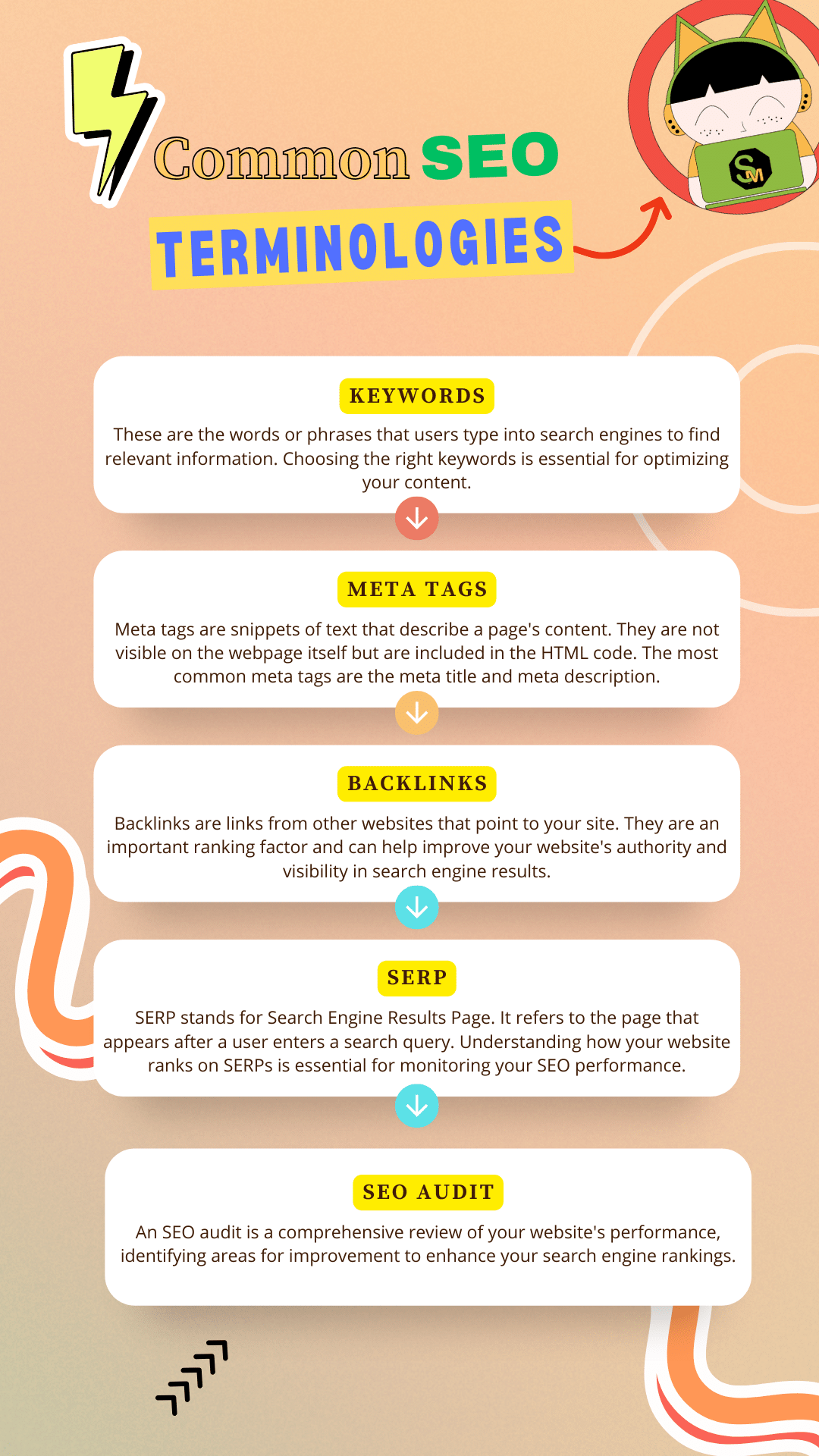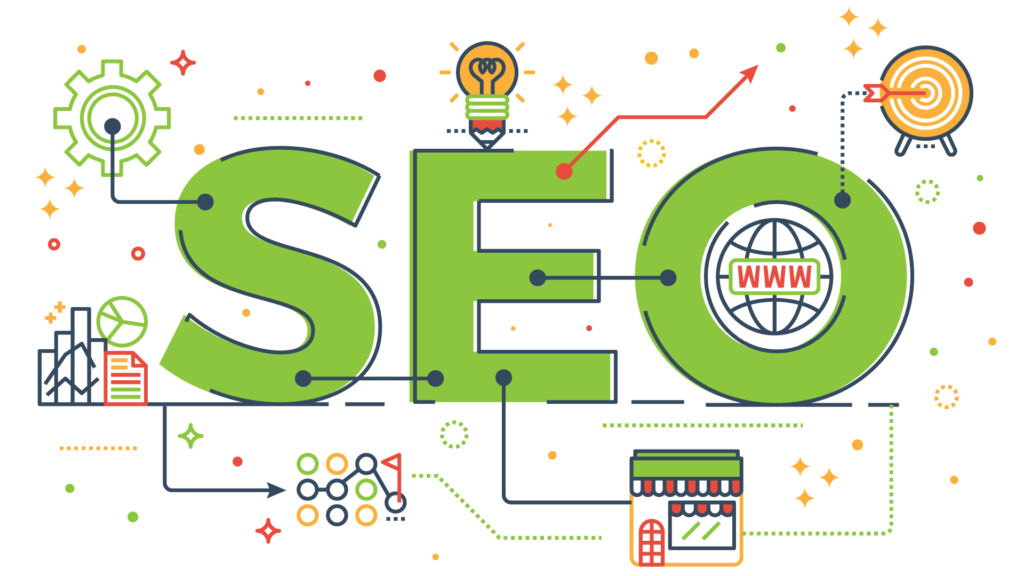
“What is SEO?” maybe a question you typed in a search and the reason why you are here. In the vast and ever-evolving landscape of digital marketing, Search Engine Optimization (SEO) remains a fundamental pillar for businesses seeking online visibility and success. Understanding the foundational principles of SEO is crucial for navigating the complex web of algorithms and ranking factors that determine a website’s position on search engine results pages.
What is SEO? At its core, SEO is about optimizing your website to enhance its visibility and relevance for search engines like Google, Bing, and Yahoo. This involves a myriad of techniques and strategies, ranging from keyword research and on-page optimization to link building and content creation.
Keyword research forms the bedrock of SEO, as it helps identify the terms and phrases that your target audience is using to search for products or services related to your business. By strategically incorporating these keywords into your website’s content, meta tags, and URLs, you can increase the likelihood of ranking higher in search results for relevant queries.
On-page optimization focuses on refining the elements within your website to improve its search engine ranking. This includes optimizing meta titles and descriptions, headings, image alt text, and internal linking structures. By ensuring that your website is well-organized, user-friendly, and technically sound, you can enhance its crawlability and indexability by search engines.
Link building plays a crucial role in SEO by establishing your website’s authority and credibility in the eyes of search engines. By acquiring high-quality backlinks from reputable websites, you can signal to search engines that your content is valuable and trustworthy, thereby boosting your chances of ranking higher in search results.
Content creation is another key aspect of SEO, as it enables you to provide valuable and relevant information to your target audience. By producing high-quality, engaging content that addresses the needs and interests of your users, you can attract organic traffic to your website and encourage social sharing and engagement.
By understanding and implementing these foundational principles of SEO, you can lay solid groundwork for improving your website’s visibility, driving organic traffic, and achieving sustainable online success. Stay tuned as we delve deeper into the intricacies of SEO and debunk common myths and misconceptions surrounding this critical digital marketing discipline.
WHAT IS SEO
SEO stands for search engine optimization. It’s the practice of making websites rank higher in the organic results of Google and other search engines. SEO, or Search Engine Optimization, is a crucial aspect of digital marketing that aims to increase a website’s visibility on search engines like Google.
It involves optimizing various elements of a website to rank higher in search engine results pages (SERPs) for relevant keywords and phrases. By implementing SEO strategies, website owners can attract more organic traffic, improve their online presence, and ultimately drive conversions.
Search engines use complex algorithms to determine which websites are the most relevant and authoritative for specific search queries. SEO helps websites align with these algorithms by optimizing on-page elements such as meta tags, headings, and content, as well as off-page factors like backlinks and social signals. Additionally, technical aspects like site speed, mobile-friendliness, and site architecture play a significant role in SEO performance.
In essence, SEO is about understanding how search engines work, what users are searching for, and how to provide the most relevant and valuable content that satisfies both search engines and users. It is an ever-evolving field that requires continuous learning, adaptation to algorithm updates, and a strategic approach to drive sustainable organic traffic growth. Mastering the fundamentals of SEO is essential for any website looking to succeed in the competitive online landscape.
Why Is SEO Important?
SEO, or Search Engine Optimization, is a crucial aspect of any online presence. It plays a significant role in ensuring that your website ranks well in search engine results pages (SERPs) and attracts organic traffic. In today’s digital age, where competition is fierce, having a solid SEO strategy is essential for businesses to increase their online visibility, drive more traffic to their sites, and ultimately boost conversions and revenue.
One of the key reasons why SEO is important is that it helps your website appear higher in search engine results when users search for relevant keywords related to your business or industry. This increased visibility can lead to more clicks, visits, and potential customers discovering your products or services. By optimizing your website for search engines, you make it easier for users to find you, which can result in higher brand awareness and credibility.
Moreover, SEO not only helps you attract more traffic but also targets quality traffic that is more likely to convert into leads or customers. By focusing on relevant keywords, creating high-quality content, and optimizing your website’s structure and performance, you can attract users who are actively searching for what you offer. This targeted approach can lead to higher conversion rates and a better return on investment for your seo marketing agency efforts.
In essence, SEO is important because it helps you establish a strong online presence, reach your target audience, drive organic traffic, and ultimately grow your business in a sustainable and cost-effective manner. By mastering the fundamentals of SEO and staying informed about the latest trends and best practices, you can unlock the full potential of your website and achieve long-term success in the digital landscape.
Common SEO Terminologies
Understanding SEO terminologies is crucial in mastering the fundamentals of what is search optimization. Here are some key terms to familiarize yourself with:
Keywords
These are the words or phrases that users type into search engines to find relevant information. Choosing the right keywords is essential for optimizing your content.
Meta Tags
Meta tags are snippets of text that describe a page’s content. They are not visible on the webpage itself but are included in the HTML code. The most common meta tags are the meta title and meta description.
Backlinks
Backlinks are links from other websites that point to your site. They are an important ranking factor and can help improve your website’s authority and visibility in search engine results.
SERP
SERP stands for Search Engine Results Page. It refers to the page that appears after a user enters a search query. Understanding how your website ranks on SERPs is essential for monitoring your SEO performance.
SEO Audit
An SEO audit is a comprehensive review of your website’s performance, identifying areas for improvement to enhance your search engine rankings.
By familiarizing yourself with these essential SEO terminologies, you can better navigate the world of search engine optimization and implement strategies to improve your website’s visibility and ranking.
THE EVOLUTION OF SEO: FROM KEYWORDS TO USER INTENT
SEO has come a long way from the days of keyword stuffing and link manipulation. In the ever-changing landscape of search engine algorithms, one fundamental shift that has significantly impacted the way websites are ranked is the focus on user intent.
In the past, SEO strategies revolved around identifying and targeting specific keywords that users were searching for. While keywords still play a crucial role in SEO, search engines have become increasingly sophisticated in understanding the context and intent behind a user’s search query.
Today, search engines like Google prioritize delivering relevant and valuable content that meets the user’s intent. This means that simply optimizing for keywords is no longer enough to rank well in search results. Websites need to create high-quality content that not only includes relevant keywords but also addresses the user’s needs and provides a positive user experience.
By understanding the evolution of SEO from a keyword-centric approach to a user intent-focused strategy, website owners can adapt their SEO tactics to align with search engine algorithms and better serve their target audience. Ultimately, by creating content that resonates with user intent, websites can improve their visibility in search results and drive organic traffic to their site.
What is SEO 101: Debunking Common Seo Myths And Disinformation
In the fast-paced world of SEO, myths and misinformation can easily cloud the understanding of what truly drives search engine optimization. By debunking common SEO myths and disinformation, we can pave the way for a clearer and more effective SEO strategy.
One prevalent myth is the belief that stuffing keywords into content will automatically boost search engine rankings. In reality, keyword stuffing can harm your website’s credibility and result in penalties from search engines. It’s crucial to focus on creating high-quality, relevant content that naturally incorporates keywords in a meaningful way.
Another common misconception is that SEO is a one-time effort that yields instant results. In truth, SEO is an ongoing process that requires consistent monitoring, adjustments, and optimization. Building a strong SEO foundation takes time and effort, and results may not be immediate, but the long-term benefits are invaluable.
By dispelling these myths and misinformation, we can shift our focus towards implementing proven SEO strategies that align with search engine algorithms and user intent. Through education and a commitment to best practices, we can unlock the true potential of SEO and drive organic traffic to our websites effectively.
What is SEO 101: SEO Strategies (White Hat vs. Black Hat)
What are seo strategies? SEO strategies can broadly be categorized into two main camps: White Hat and Black Hat.
White Hat SEO refers to ethical practices that focus on optimizing a website for search engines while maintaining the integrity of the site and following search engine guidelines. This includes creating high-quality content, using relevant keywords, optimizing meta tags, and building quality backlinks through legitimate means.
White Hat SEO aims to improve website visibility in search engine results pages (SERPs) through organic, sustainable methods that provide long-term benefits.
On the other hand, Black Hat SEO involves using aggressive, manipulative techniques to quickly boost search engine rankings. This may include keyword stuffing, cloaking, buying links, or other tactics that violate search engine guidelines and can lead to penalties or bans from search engines.
While Black Hat strategies can yield quick results, they are often short-lived and can cause long-term damage to a website’s reputation and visibility.
As a website owner or SEO professional, it is crucial to understand the differences between White Hat and Black Hat SEO strategies and choose the approach that aligns with your long-term goals and values.
While Black Hat techniques may offer temporary gains, investing in White Hat SEO practices can lead to sustainable growth, improved user experience, and a strong online presence that withstands algorithm updates and changes in the search landscape. By prioritizing ethical SEO practices, you can build a solid foundation for your website and establish credibility and trust with both users and search engines.
What is SEO 101: The Role Of Content In SEO Success
Content is the cornerstone of SEO success. High-quality, relevant, and engaging content is not only crucial for attracting and retaining visitors to your website but also plays a significant role in improving your search engine rankings. Search engines like Google prioritize content that provides value to users, answers their queries, and addresses their needs.
When creating content for your website, it’s essential to focus on providing valuable information that is well-researched, well-written, and optimized for relevant keywords.
This means understanding your target audience and creating content that resonates with them. Incorporating relevant keywords strategically throughout your content can help search engines understand the context of your content and rank it higher in search results for related queries.
Moreover, fresh and updated content signals to search engines that your website is active and relevant, which can positively impact your SEO efforts. Regularly publishing new content, such as blog posts, articles, videos, or infographics, can help attract more organic traffic to your site and improve your overall SEO performance.
In summary, content is king in the realm of SEO. By focusing on creating high-quality, relevant, and optimized content, you can enhance your website’s visibility, attract more organic traffic, and ultimately improve your search engine rankings.
What is SEO 101: Google’s E-E-A-T Guidelines
Google’s E-A-T guidelines, which stand for Experience, Expertise, Authoritativeness, and Trustworthiness, are crucial factors that Google considers when evaluating the quality of a website’s content. Expertise refers to the level of knowledge and skill demonstrated by the content creators in a specific field.
Authoritativeness pertains to the credibility and reputation of both the content creators and the website itself within their respective industry. Trustworthiness relates to the reliability and transparency of the information provided on the website.
To ensure that your website adheres to Google’s E-E-A-T guidelines, it is essential to showcase your expertise by publishing high-quality, accurate, and relevant content that reflects your knowledge and experience in your niche.
Establishing authoritativeness involves building a strong reputation through backlinks from reputable sources, endorsements from industry experts, and positive user reviews. Trustworthiness can be achieved by providing clear and verifiable information, maintaining an honest and transparent approach, and demonstrating a commitment to user privacy and data security.
By focusing on improving your website’s E-E-A-T factors, you can enhance your search engine rankings and credibility, ultimately leading to increased organic traffic and better user engagement.
What is SEO 101: Seo And Google Algorithm Updates
Understanding and keeping up with Google algorithm updates is crucial in the world of SEO. Google frequently releases updates to its algorithms, impacting how websites are ranked in search results. It is essential for website owners and SEO professionals to stay informed about these updates to ensure their websites are optimized effectively.
When Google releases a new algorithm update, it can significantly impact a website’s ranking. Some updates may reward websites that follow best practices and provide high-quality content, while others may penalize sites engaging in tactics considered manipulative or spammy.
To navigate these updates successfully, it is important to stay updated on industry news, follow reputable SEO blogs and forums, and implement white-hat SEO strategies that align with Google’s guidelines. By staying informed and adapting to algorithm changes, website owners can maintain or improve their search engine rankings, driving more organic traffic to their sites.
Embracing these updates as opportunities to enhance SEO strategies and deliver valuable content to users can lead to long-term success in the ever-evolving landscape of search engine optimization.

WHAT IS ON-PAGE SEO
On-page SEO is a crucial aspect of search engine optimization that focuses on optimizing individual web pages to rank higher and earn more relevant traffic in search engines. It involves optimizing both the content and HTML source code of a page to make it more search-engine-friendly.
Key elements of on-page SEO include optimizing meta tags (such as title tags and meta descriptions), using relevant keywords, creating high-quality content, optimizing images and multimedia, improving page load speed, and enhancing the overall user experience.
By mastering the fundamentals of on-page SEO, website owners can improve their search engine rankings, increase organic traffic, and ultimately achieve their digital marketing goals.
On-Page Optimization: Best Practices And Strategies
On-page optimization is a crucial aspect of SEO that can significantly impact your website’s visibility and ranking on search engine results pages. By implementing best practices and strategies for on-page optimization, you can improve the relevance and quality of your content, making it more attractive to both users and search engines.
One key aspect of on-page optimization is the use of targeted keywords. Conduct thorough keyword research to identify relevant search terms that your target audience is using. Incorporate these keywords strategically into your content, including in titles, headings, meta descriptions, and throughout the body of your text. However, ensure that your keyword usage is natural and does not compromise the readability or quality of your content.
Optimizing your website’s meta tags, such as title tags and meta descriptions, is another essential on-page optimization strategy. These elements provide valuable information to search engines about the content of your pages, helping them understand the context and relevance of your website. Craft compelling and descriptive meta tags that accurately reflect the content of each page while also enticing users to click through to your site.
Additionally, optimizing your website’s URL structure, internal linking, and image optimization are all important aspects of on-page optimization that can positively impact your SEO efforts. By following best practices and implementing these strategies effectively, you can create a more search engine-friendly website that is well-optimized for improved visibility and ranking on search engine results pages.
Technical Seo: Optimizing For Search Engines
Technical SEO is a crucial aspect of optimizing your website for search engines. This involves ensuring that search engine crawlers can easily access and index your site, leading to improved visibility and rankings in search results.
One key technical aspect of SEO is ensuring that your website has a clean and crawlable site structure. This includes optimizing URL structures, using proper headings and meta tags, and creating an XML sitemap to help search engines understand the content on your site.
Additionally, site speed plays a significant role in SEO performance. A fast-loading website not only provides a better user experience but also signals to search engines that your site is well-maintained and valuable to users.
Mobile optimization is another critical technical SEO factor. With the majority of internet users now accessing websites on mobile devices, it is essential to ensure that your site is responsive and provides a seamless experience across different screen sizes.
By paying attention to these technical SEO fundamentals, you can enhance your website’s search engine visibility and attract more organic traffic to your site.
The Importance Of Mobile Optimization And Site Speed
Mobile optimization and site speed are two crucial factors that can significantly impact your website’s performance and search engine rankings. In today’s digital age, where mobile devices have become the primary means of accessing the internet, ensuring that your website is optimized for mobile users is essential.
Google considers mobile-friendliness as a key ranking factor, meaning that websites that are mobile responsive and provide a seamless user experience on smartphones and tablets are more likely to rank higher in search results. This is because Google aims to deliver the best possible user experience to its users, and mobile optimization plays a critical role in achieving this goal.
In addition to mobile optimization, site speed is another crucial aspect of SEO that should not be overlooked. Users expect websites to load quickly, and search engines like Google take loading speed into account when ranking websites. A slow-loading website can lead to higher bounce rates, lower engagement, and ultimately, lower rankings in search results.
By optimizing your website for mobile users and improving its loading speed, you can enhance the user experience, increase engagement, and improve your search engine rankings. Investing time and resources into mobile optimization and site speed optimization is a strategic move that can yield significant benefits in terms of SEO and overall website performance.
WHAT IS OFF-PAGE SEO
Off-Page SEO is a crucial aspect of search engine optimization that focuses on improving your website’s authority, relevance, and reputation through external factors. Unlike On-Page what is SEO, which involves optimizing content and technical elements on your website, Off-Page SEO deals with activities that take place outside of your website.
These activities help search engines understand the credibility and popularity of your site, ultimately influencing your rankings in search results. Off-Page SEO typically involves building backlinks from high-quality and relevant websites, social media engagement, influencer marketing, and online reputation management.
By engaging in Off-Page what is SEO strategies effectively, you can enhance your website’s visibility, trustworthiness, and overall ranking potential in the competitive digital landscape.
Off-Page Seo: Building Authority And Trust
Off-Page SEO plays a crucial role in building authority and trust for your website. While on-page what is SEO focuses on optimizing your website’s content and structure, off-page what is SEO deals with enhancing its reputation and credibility in the digital world.
One of the most significant factors in off-page SEO is link building. High-quality backlinks from reputable websites act as upvotes for your site in the eyes of search engines. These backlinks signal to search engines that your website is a reliable source of information, thereby improving your search engine rankings.
Engaging in guest posting, creating shareable content, participating in online communities, and collaborating with influencers are effective strategies to acquire valuable backlinks. However, it is essential to prioritize quality over quantity when it comes to link building, as spammy or irrelevant links can have a negative impact on your website’s what is SEO performance.
Additionally, building a strong presence on social media platforms and engaging with your audience can also contribute to your website’s off-page what is SEO success. By fostering a positive reputation online and generating social signals, you can further establish your website as a trustworthy and authoritative source within your industry.
Overall, investing time and effort into off-page what is SEO practices is essential for building authority and trust in the digital landscape, ultimately helping your website achieve higher rankings and visibility in search engine results.
TRACKING AND MEASURING SEO SUCCESS: KEY METRICS TO MONITOR
Tracking and measuring the success of your what is SEO efforts is crucial to understanding what is working and what needs improvement. By regularly monitoring key metrics, you can gain valuable insights into the performance of your website and optimize your SEO strategy accordingly.
One of the most fundamental metrics to monitor is organic traffic, which refers to the number of visitors who arrive at your website through organic search results. By tracking changes in organic traffic over time, you can assess the effectiveness of your SEO for beginners and identify trends that may require further investigation.
Another important metric to monitor is keyword rankings. By tracking the positions of your target keywords in search engine results pages (SERPs), you can gauge the impact of your optimization efforts and identify opportunities for improvement. Additionally, monitoring keyword rankings can help you identify new keyword opportunities to target.
In addition to organic traffic and keyword rankings, it is essential to track other key metrics such as click-through rate (CTR), bounce rate, conversion rate, and return on investment (ROI). These metrics provide valuable insights into user engagement, website performance, and the overall effectiveness of your what is SEO strategy.
By regularly tracking and measuring these key metrics, you can gain a comprehensive understanding of your what is SEO performance and make informed decisions to improve your search engine visibility and drive organic traffic to your website.

CONCLUSION
Mastering What is SEO 101 is crucial for achieving sustainable growth in the online landscape. By understanding the core principles of search engine optimization and implementing them effectively, businesses can enhance their online visibility, attract relevant traffic, and ultimately drive conversions.
Throughout this journey of demystifying SEO fundamentals and dispelling common disinformation, we have delved into the importance of keyword research, content optimization, technical SEO, and link building strategies. These pillars form the foundation of a successful SEO strategy, guiding businesses towards higher rankings and increased organic traffic.
It is imperative for businesses to stay updated with the ever-evolving SEO landscape, as search engines continually refine their algorithms and ranking factors. By staying informed about the latest trends and best practices in SEO, businesses can adapt their strategies to remain competitive and relevant in the digital realm.
In conclusion, mastering fundamentals is not merely a one-time task, but an ongoing commitment to optimizing your online presence for long-term success. By consistently applying What is SEO 101 principles, monitoring performance metrics, and refining your strategies, you can position your business for sustainable growth and continued success in the dynamic world of search engine optimization.



